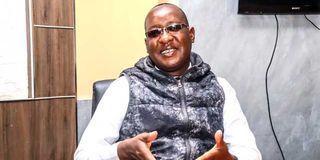
David Wanjala during an interview at Nation Centre in Nairobi on June 6, 2024.
Four years ago, David Wanjala received the most amazing news from his dear wife; he was going to be a father for the second time. He beamed with joy and started imagining all the wonderful adventures he was going to have with his son once he was born. This being his second child, he was more confident in his fatherhood abilities.
Unfortunately, a few months into the pregnancy, David’s wife started spotting. As they went to the hospital, they hoped all would be well because it is not uncommon for women to spot a little during pregnancy. At the hospital, their gynaecologist asked to do an ultrasound to check on the baby. There was no heartbeat.
David and his wife decided to seek a second opinion, praying to get a different report. Here, their worst fears were confirmed. They had lost the baby.
“I knew we were losing our son even as we sought a second opinion. I had this gut feeling; I knew I was not going to be the father of that child, and it broke my heart,” David, 46, says.
Breakfast gone wrong
Although his wife needed to undergo surgery to evacuate the womb, they couldn’t afford the procedure. This added pain to an already desperate situation. David knew he needed to act first because his wife’s health was at stake. He reached out to friends and family and five days later, he had managed to raise the funds needed for the surgery.
He, however, recounts that those were the longest five days of his life. The mental anguish of watching his wife carry their dead son in her womb for those five days was overwhelming.
On the morning of the surgery, David decided to treat his wife to a fancy breakfast in a restaurant just to take the edge off a bit. They made their way to the hospital afterwards, and the wife went to the theatre. While on the operating table and under anaesthesia, his wife started choking on the food she had eaten earlier. You see, David did not know that one should not eat anything at least eight hours before surgery. He had inadvertently put his wife’s life in danger. Thankfully, the doctors were able to handle the situation and she had a successful surgery.
David watched painfully as the doctors discarded his late son in what he describes as a metallic bucket. To them, he was just a mass of blood but David wished the procedure had been handled with some dignity.
“My son had a name; he was called Michael. I needed to carry his memory in my mind and my heart, and I was denied that chance; it is not easy to live with that,” he says.
Grieving alone
The days, weeks, and months that followed were hard for David; the loss of his son left him wounded. He was still shaken by the thought of nearly losing his wife and worst of all, he did not get to give his late son, Michael, a proper goodbye. When friends and family came to condole with the family, he felt like a forgotten griever. Most, if not all, people came to comfort his wife.
“Nobody ever came to tell me, ‘Hey man, how are you doing? How are you coping with this?’ To encourage me to move forward. They were sad moments for me and I became very lonely.”
The grief started rocking their marriage. David reminisces the days they would hold hands in public, hug warmly, and peck here and there. But as the days went by, the public displays of affection faded away. He was even scared of getting intimate with his wife, fearing that history might repeat itself.
When it was all too much to bear, he joined a support group for grieving parents, where he connected with other hurting fathers. It has since become his haven. The trauma of losing his son still lingers in his mind.
“Every time he sees a pregnant lady, I pray that God will help them carry their child to term.”
In memory of their son, David and his wife planted a tree. Michael would have turned three on May 3rd.
They hope to start telling their older child about Michael, the brother he never got to meet, once he is old enough to understand.
A brief encounter
As Lukase Libamira burps his three-month-old son, it is evident that fatherhood is a crown he wears with pride. His face is radiant as he holds the little one up. Looking at him, you wouldn’t believe the wounds he bears after losing his son in 2022.

Lukase Libamira and wife Primrose Lukase lost their firstborn child in 2022.
When Lukase found out his wife was expecting their first child, he was beside himself with joy. He caught the shopping bug and started stocking cute outfits and essentials for the baby. He accompanied his wife to the prenatal clinics and always looked forward to the ultrasounds.
However, Lukase began sensing something was off around the sixth month of the pregnancy. From the scans, the pregnancy hadn’t grown in size since the third month. Despite this, the baby seemed okay and was even seen tossing and kicking on the scans.
Things, however, took a dramatic turn in the seventh month when his wife stopped feeling the baby kicks. The scans, once again, showed that the baby was okay, but a final scan noted that the baby’s heartbeat was faint. His wife needed surgery immediately. The procedure was going to drain them financially, so the doctor referred them to a mission hospital, which was more affordable.
The baby was delivered through C-section (Caesarean section) and placed in the neonatal intensive care unit. Lukase still remembers the first time he laid his eyes on his son.
“The baby was very small; he could fit in the palm of my hand. He had tubes in his chest to help with breathing because the lungs weren’t strong.”
The doctors monitored their son, but unfortunately, two days later, they called the couple to a room to break the sad news. He was not responding to treatment, and there was nothing else they could do. Torn between giving their son a chance to fight and pulling the plug, the couple gave it some thought and settled for the latter. They allowed the hospital to give their son a proper send-off, something that did not sit well with some relatives.
“I got a nasty text from one relative who bashed me saying ‘Lukase you’ve done wrong, this is our child, this is not your child.”
The father-of-two admits that he felt like God had been unfair and had many questions for Him. He did not understand why God had forsaken him despite having served in the church for more than 15 years.
Just like David, Lukase felt overlooked when people came to console the family. They comforted his wife and assumed he was okay. One time, he was even left to fix snacks and tea for visitors as they sat with his grieving wife. No one thought to ask him how he was doing. He describes that season of grieving as lonely and confusing.
Like David’s, his marriage was falling apart, but on the brink of collapse, someone introduced him to a grief support group.
After attending a few meetings, Lukase almost quit after he realised he was the only man in the group. However, the women were encouraged by his attendance and started inviting their grieving husbands. After a while, Lukase also invited his wife, and this had a positive impact on their marriage.
In memory of their late son, Zuriel, the hospital gave them a printout of his fingerprints and footprints, which they framed.
Cleopa Njiru, a counselling psychologist, encourages men to be in touch with their emotions and allow themselves to grieve, adding that they should not succumb to the pressure of having to be strong. He, however, highlights that he has noticed a significant improvement in the number of men who call counselling institutions seeking help and book sessions.
In cases where there is another child in the picture at the time of the loss of a child, he advises parents to involve the children in the grieving process. He emphasizes that the loss of a child does not only affect the parents, but the siblings, and if the child’s grief is overlooked, the negative impact of the suppressed grief will emerge later in their life. If the parents are not too sure how to go about supporting their child through this moment, there are child counsellors who will help with that.
How to grieve right
Many men are forced to bury their pain inside for years, to the detriment of their health and well-being.
Wambugu Wakahora, a psychologist, highlights tell-tale signs of grief taking a toll on such men,
“The father definitely will go through stress, and anxiety and at times he will be withdrawn. Depending on a man’s ego, he might find it hard to seek help. He may develop psychosomatic illnesses such as headaches, fatigue or tiredness because there is so much going on inside his head. Some may choose to use unhealthy ways to mourn the loss, such as alcoholism, cultism and lack or loss of spirituality.”
Grieving involves a lot of hard emotional work, which many men are not willing to do.
“The five stages of grief would still apply in this case. The process of mourning starts with denial, where the father could be in denial and not even want to talk about it. So nothing changes until he overcomes the denial. The next stage would be anger, where he would express himself, but not in a healthy way, probably with some outbursts. The bargaining stage follows, where he asks why it happened to him. Then comes, depression, where he would have mood swings. Lastly, he would finally be able to accept the loss, even talk about it, and move on,” he said.
However, the five stages of grief do not have a definite time, but it helps to talk to someone.
“Family members and friends can create a safe space for the father to grieve. Most importantly, he should have family therapy with his wife because, most of the time, when such losses happen, nobody should be blamed,” he explained.
The key to it all is acceptance, Wambugu says. Even for fathers who wish to try again, post-traumatic stress disorder can become an issue as they fear getting their wives pregnant again, thinking they will suffer the same loss. These fears make it hard to move on, especially when people start comparing one pregnancy with another.
“To get over the fear, the father has to reinforce positive thinking to make sure that he does not get stuck in his head,” he said.
Additional reporting by Sylvia Muia





